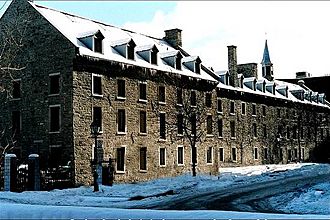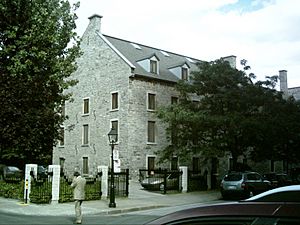Grey Nuns' Hospital facts for kids
Quick facts for kids Grey Nuns' Hospital |
|
|---|---|
|
Ancien hôpital général de Montréal (Hôpital-des-Sœurs-Grises)
|
|

The Grey Nuns' Hospital building in 2009
|
|
| Alternative names | Hôpital général des frères Charon, Former General Hospital of Montreal |
| General information | |
| Type | Former hospital |
| Architectural style | Early French Canadian architecture |
| Address | 138 Saint-Pierre Street |
| Town or city | Montreal, Quebec |
| Country | Canada |
| Coordinates | 45°30′00″N 73°33′17″W / 45.5°N 73.5548°W |
| Completed | 1765 |
| Official name: Grey Nuns' Hospital National Historic Site of Canada | |
| Designated: | 1973 |
| Official name: Ancien hôpital général de Montréal | |
| Type: | Classified heritage immovable |
| Designated: | 2013 |
The Grey Nuns' Hospital was an important hospital in Montreal, Quebec, Canada. It was also known as the Hôpital général des frères Charron. This hospital helped people for a very long time, from 1695 to 1880. It is located in the southern part of Old Montreal, near Place d'Youville.
History
Early Beginnings
The hospital was first called Hôpital général des frères Charron. This name came from a French religious group called the Frères Charron. Their main goal was to care for people who were poor or sick.
The hospital building was first built in 1695. At that time, it was located just outside the main walls of the city. In 1747, a group of nuns called the Grey Nuns took over running the hospital.
Rebuilding After a Fire
In 1765, a big fire damaged the hospital. It was rebuilt soon after, using a style common in New France (which is what Canada was called when it was a French colony). The new building had strong, thick walls made of rough stone. These stones were then covered with plaster.
The building's design was very practical. It had little decoration. The roof was shaped like a triangle (called a gable roof) to stop snow from piling up in winter. This design also made the building less likely to catch fire again. Metal pieces shaped like an "S" were used to make the building even stronger. These "esses" helped hold the wooden frame together.
Later Years and Recognition
In 1880, the Grey Nuns decided to rent out the hospital building. They kept some offices there for their community.
Many years later, in 1971, the Grey Nuns moved back into their original first home. The building then went through big repairs and updates.
Because of its long history and importance, the site was named a National Historic Site of Canada in 1973. This means it is a special place that helps tell the story of Canada.
 | Sharif Bey |
 | Hale Woodruff |
 | Richmond Barthé |
 | Purvis Young |


